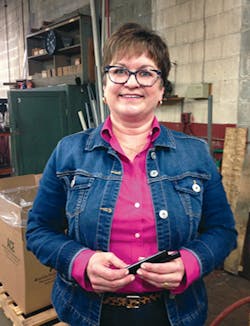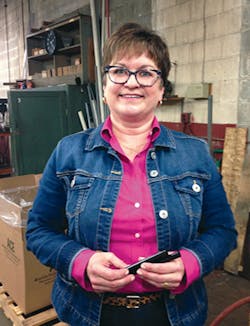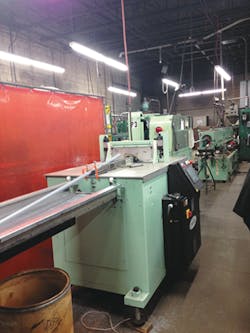Absolute Custom Extrusions Inc. (ACE), Milwaukee, began business in 1986 with a specialization in tubing, profiles and coated wire and cable. Its current products include regular and oversized tubes for protecting golf clubs; coffee and cocktail stirrers; and drinking straws. It has customers throughout North America and Europe.
The company is emerging from tough times, having transitioned from a 24/7 operation before the Great Recession to one that's much leaner now. Now with just one shift and a workforce of 10, it is poised for growth, said President Barbara Cupertino-Remsing. Recent equipment purchases — focused on automation and efficiency — are one reason why.
"The last four years, we have been able to achieve so many of our goals," Cupertino-Remsing said. "It's constantly looking at how we can improve ourselves and our processes." The company is positioning itself to win back customers lost to off-shoring through its commitment to service and product quality. Goal No. 1 is meeting the exacting standards of its customers.
That's no small feat, considering the tight tolerances that ACE's equipment must handle. Its cocktail stirrers, which it markets under the brand name Poly Straw, are extruded with an outer diameter of 0.128 inch, an inner diameter of 0.117 inch and a wall thickness of 0.0055 inch. Its coffee stirrers are produced with an outer diameter of 0.134 inch and inner diameter of 0.118 inch, at lengths of 5 inches.
While the company continually seeks to diversify its business, the straws remain a mainstay. ACE makes 3 million cocktail stirrers every 24 hours, which it packages in cases of 10,000. "And, we sell by the pallet load, which is 108 cases. At a minimum," Cupertino-Remsing said.
The precision needed for the consistency and tolerances needed to produce the stirrers is made possible by a combination of updated technology in screws, dies and the machines themselves. ACE is in an area where many tool and die shops are available, and it makes use of those resources, Cupertino-Remsing said. But the maintenance on the screws and dies is done in-house, and ACE also performs some of its own tool design. The company relies on other shops for electrical discharge machining (EDM) technology to enhance tool quality and cost effectiveness.
Selecting machineryand ensuring quality
At ACE's facility, which Plastics Machinery Magazine recently visited, six extrusion lines make tubes and other custom profiles as demand requires. Typically, Cupertino-Remsing approaches equipment purchases based on the demand that she and others within the company are seeing in the market.
"If we're quoting a lot of jobs and we're not getting them for specific reasons that we find out, those are the kind of things that drive, at least, the discussion," she said. "What do we need to stay competitive? What are some of the people telling us why we're not getting the jobs that we really want? Now, for an example, I'm working on a project, it's a reusable straw. Everything was made in China. They're trying to bring it back. We are making parts for some of our larger customers, shipping them down to Mexico where they do the assembly and such, which always makes me proud, and, I think there are maybe three or four customers that we have where they ship our product to Mexico."
An NSF International-approved PVC pipe for potable water has become a key product. NSF is a public health and safety organization that sets standards to protect food, water and consumer products. Because they must meet exacting standards and tolerances, the water pipes present manufacturing challenges, Cupertino-Remsing said. ACE has confronted them. "This is one of the biggest industries that we serve."
The equipment used for the pipe required customization. Because other pipe tooling could not meet tolerances, ACE needed a custom screw. "It's especially designed for the exact material that we are using and have used and allows us to hold tighter tolerances and run with less scrap and more consistency from batch to batch or lot to lot," Cupertino-Remsing said.
With the screw, paired with a 2.5-inch Davis-Standard extruder ACE purchased last year, the company has improved its throughput.
"When you're running with tighter tolerances, everything has to be high precision to get that final product," she said.
ACE has made a commitment to continuous-feed Davis-Standard extruders, which simplifies both processing and maintenance operations. "We like to stick with the same family of extruders, so that we have a standardized process," Cupertino-Remsing said. The extruders are interchangeable and ACE always has a backup. Operators use gauges from Gefran Inc., Winchester, Mass., to measure melt pressure and temperature within the extruder.
The daughter of a couple who ran their own extrusion company, she said she learned from an early age the importance of machine maintenance. Her parents had their company for 27 years, and she prizes a picture of herself as young girl working alongside her grandmother at an extruder. Her father's lesson to her: "Take care of your equipment."
Downstream dynamics
Downstream of the new Davis-Standard extruder, ACE uses a new TS up-cut saw from Conair Group, Cranberry Township, Pa., to cut sections of pipe. It's programmed electronically, so operators just have to push a button to use it. Compared to prior equipment, the model is faster, with larger cutting capacities and a redesigned cabinet for easier servicing. The saw has eliminated the need for secondary cutting operations.
The saw's speed means that ACE can more competitively price its products. The benefits, though, go beyond cutting operations and are evident even further downstream, where operators can devote their time to inspecting products and packaging them according to customers' particular requirements.
"The operator is able to focus on other things, because the saw is predictable, reliable and repeatable," Cupertino-Remsing said.
Elsewhere, the company uses a cutter for thinner-walled products, including housewares and automotive products. The cutter, from RDN Manufacturing Co. Inc., Bloomingdale, Ill., can maintain tighter tolerances, thanks to its servo drive, Cupertino-Remsing said.
Meeting tough specifications is part of ACE's strategy, which stresses documentation and data analysis.
"Are we running in spec like we quoted for the customer? Our operators are in charge of quality," she said. "Everything is so much more technical. It's not stored up in our heads anymore."
ACE is very strict about its process. The equipment has specific set-up cards that detail everything. It's all part of the process of meeting customers' needs.
"I like to listen to hear what is going on with these people," Cupertino-Remsing said. "You have to be able to open your mind and listen."
To ensure that lines are running as efficiently as possible, ACE uses encoders from Dynapar, Gurnee, Ill., so that the workflow of downstream equipment, such as a cutter or saw, matches the extruder making the product.
Upstream, the company uses recently purchased Conair hopper loaders to transport resin to the machines. Cupertino-Remsing said adding the units has paid dividends. "The new models reduce the fines and the dust from the raw material, which basically prevents the screens in the extruder from plugging up." They require less maintenance and have made material changes easier — an important benefit for a custom extrusion company with a growing portfolio of products.
A Way of thinking
Because of rigorous quality improvements over the past few years, Cupertino-Remsing said that operating the factory has become a lot easier. These included standards upgrades that brought the company its ISO 9001:2008 certification, as well as the adoption of a management philosophy called the Entrepreneurial Operating System, or EOS.
"It's made my job a heck of a lot easier. We are holding people accountable for their responsibilities and if there is a problem, it gets talked about a lot sooner than it used to," she said. The company and its management team track their goals every 90 days. With the strategy, Cupertino-Remsing can take a hard look at the business and her employees, using data to guide her decisions.
"We've changed our way of thinking, we've changed our target markets," Cupertino-Remsing said. Besides the NSF-approved pipe and drink stirrers, ACE also extrudes tubes and rods for water treatment, including hot- or cold-water tubes, distributor tubes, float rods, brine tubes and riser tubes. Renewable energy is another market. ACE extrudes components for use in wind and solar systems, and rechargeable batteries. With prototypes based on its branded golf tubes, it also makes products such as fishing rod holders and quivers. It uses a diverse array of materials, including PU, HDPE, LLDPE, PVC and even recycled materials.
Despite the challenges of the past few years, Cupertino-Remsing is confident in the future. One reason is because she thinks customers have begun to realize the advantages of using U.S. suppliers, rather than outsourcing, which she blames for some of the downturn the company experienced.
"One of the things that's really important to me is made in America, and I think over the last 10 years, that's really catching on," she said.
Angie DeRosa, managing editor
Karen Hanna, copy editor
Contact:
Absolute Custom Extrusions Inc., 414-332-8133, www.ace-extrusions.com
About the Author
Karen Hanna
Senior Staff Reporter
Senior Staff Reporter Karen Hanna covers injection molding, molds and tooling, processors, workforce and other topics, and writes features including In Other Words and Problem Solved for Plastics Machinery & Manufacturing, Plastics Recycling and The Journal of Blow Molding. She has more than 15 years of experience in daily and magazine journalism.



